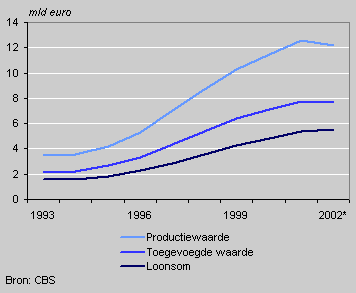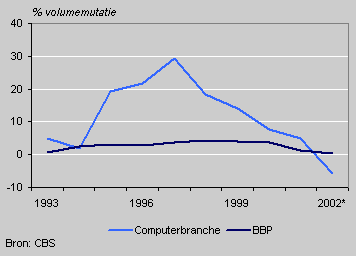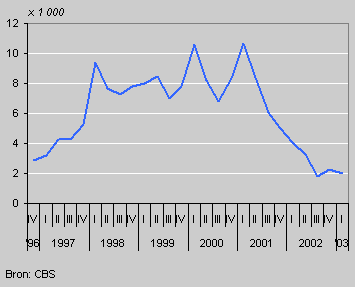Computer branch under pressure

After ten years in which the computer branch grew ten times as quickly as GDP, the growth has now slipped into a decrease.
Key figures computer branch, 1993–2002*

Stormy growth
The computer industry produced nearly 12.2 billion euro worth of goods and services in 2002, more than three times as much as in 1993.
The growth in the computer branch started around 1995-1996. The industry underwent a period of stormy growth as information technology was applied on an increasingly wider scale. The turn of the millennium and the switch from the guilder to the euro gave the branch an extra boost. Because of the foreseen millennium problems, many companies, government agencies and households invested in new computers and software.
Value added in the computer branch and GDP

Millennium boom
The value added of computer service bureaus increased more than four times as fast as GDP in the period 1993–2002. In 1993 the value added of this sector accounted for only 0.8 percent of GDP, by 2001 this had grown to nearly 2 percent.
This share in GDP has had hardly grown since 1999. In that year most millennium projects were completed and the dip set in.
The largest volume change in this branch was in 1997, when value added increased by nearly 30 percent. In 2002 growth was negative.
Vacancies in the computer branch

More than 100 thousand man-years of work
The computer industry comprised some 17.5 thousand companies in 2002, nearly three times as many as in 1993. The number of employees, in terms of man-years, increased from around 37.5 thousand in 1993 to nearly 106 thousand in 2001. In the years 1996–1999 the number of man-years grew by 10 to 14 thousand per year; in 2002 it fell to 103 thousand.
This rapid growth was partly caused by the large numbers of students at vocational colleges and university opting for IT courses or retraining in these disciplines.
The employment growth in the sector lessened from 2000. The number of vacancies, which increased up to 2000, has also been decreasing more quickly since the fourth quarter of 2001.
Hanneke Burger and Paul Mangoenkarso